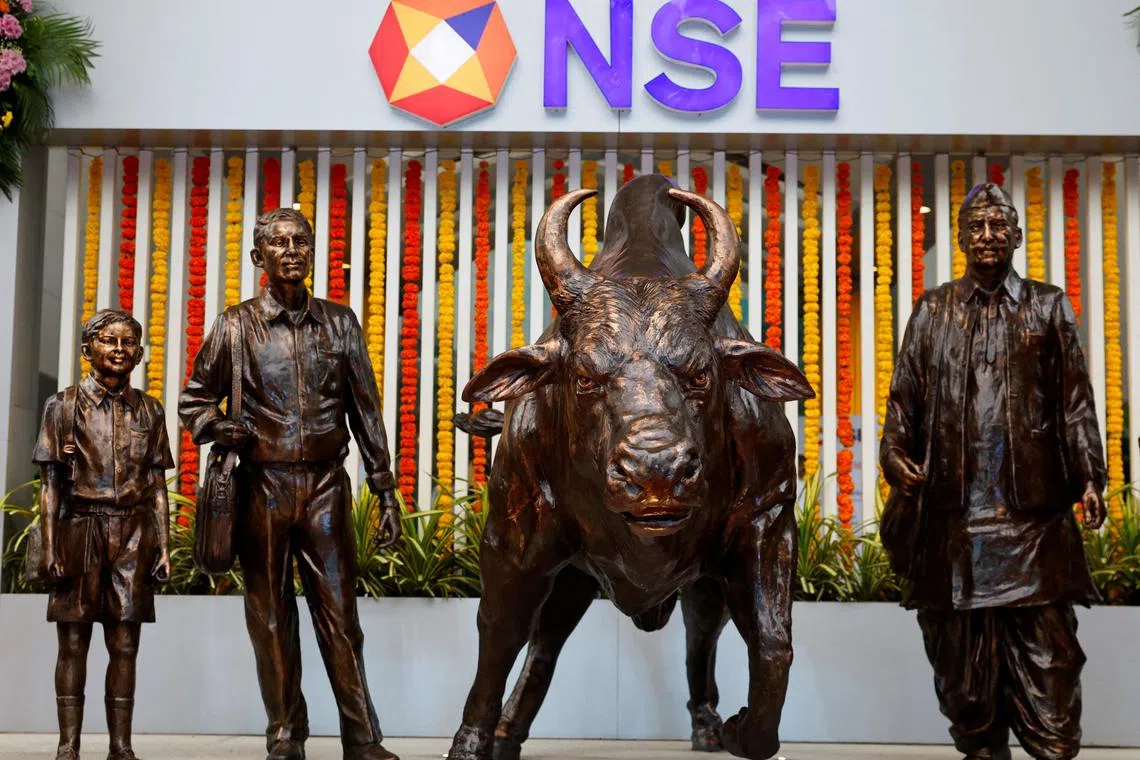India’s IPO boom in 2024 turns seven company founders into billionaires
Sign up now: Get ST's newsletters delivered to your inbox

Around 85 companies aim to list on India's stock exchanges in 2025, collectively targeting 1.53 trillion rupees (S$24.4 billion).
PHOTO: REUTERS
Follow topic:
MUMBAI - A blockbuster year for initial public offerings (IPOs) in India catapulted seven entrepreneurs into the US dollar billionaires league, many of them early movers in the country’s booming renewable energy sector.
Mr Chiranjeev Singh Saluja of Premier Energies is among those who successfully rode the wave.
“My father was in the business of supplying hand pumps to rural villages,” the 51-year-old said in an interview. “He saw that access to electricity was sparse in those areas, so he started Premier Solar in 1995.”
Three decades on, the company rechristened Premier Energies is the country’s second largest integrated solar module and solar cell manufacturer behind the Adani Group.
Investors bullish on the government’s investments in solar energy have bid up Premier shares nearly threefold since their debut in September, valuing it at roughly US$7 billion (S$9.6 billion).
Mr Saluja is one of the four entrepreneurs in the renewable energy space whose personal fortunes have soared after their companies listed on the stock exchanges in 2024.
The others are Mr Hitesh Doshi of the Waaree Group, which also makes solar modules, Mr Bhavish Aggarwal of electric vehicle maker Ola Electric Mobility and Mr Manoj Upadhyay of solar energy generator Acme Solar Holdings.
A similar trend could play out in India’s equity market, which was on a roll in 2024, with a record 1.66 trillion rupees (S$26.5 billion) raised through IPOs compared with 650 billion rupees in 2023.
Around 85 companies aim to list on the stock exchanges in 2025, collectively targeting 1.53 trillion rupees, according to data from Prime Database.
At the same time, issuers will have to brace themselves for headwinds from a slowing economy, weak corporate profits, a volatile rupee, tepid consumer spending and incoming US President Donald Trump’s tariff policies.
Mr Kunal Rambhia, fund manager and head of trading strategies at The Streets, a Mumbai-based long-short fund, expects rising global tensions and the threat of tariffs to trigger a deep correction in the market in 2025.
“The IPO trend will continue for the first half of 2025, but could slow down in the second. Start-ups and tech companies will find it harder to list, particularly in the second half because there could be a liquidity crunch,” he said.
Others are more sanguine, considering that domestic inflows into equities have been strong for a while now.
“The Indian IPO market is no longer dependent on foreign investors as domestic investors and domestic institutions have enough money,” said Mr Himanshu Kohli, co-founder of Client Associates, a multi-family office and private wealth adviser managing over US$6 billion in assets.
“Private equity firms and family offices have moved a huge amount of money into unlisted shares and pre-IPO companies over the last year in anticipation of a successful exit in 2025,” said Mr Kohli.
That should hearten IPO-bound companies, with the pipeline likely to be dominated by financial services companies, electronic manufacturers, power generation firms and software companies.
Big names expected to file for listing in 2025 include Nexus Venture Partners-backed online grocer Zepto, Walmart-backed e-commerce giant Flipkart India, payments firm PayU and its rival Pine Labs.
Billionaire Mukesh Ambani’s Reliance Industries is expected to carve out its retail business and telecommunications entity as separate listed companies.
Over the last three years, India’s IPO markets have been dominated by a flood of micro, small and medium-sized companies, with 90 per cent of them raising less than US$100 million, according to data compiled by Bloomberg.
While 2025 may see some large, well-known companies list their shares, everyday entrepreneurs across India do not want to miss out on the IPO boom.
“Founders have realised that it is better to own 75 per cent of a US$100 million company listed on the exchanges than own 100 per cent of a US$10 million company,” said Mr Vishnu Agarwal, chief executive of Stock Knocks, a Kolkata-based investment research company.
“There is going to be a tsunami of deals in the coming year as founders are hungry for growth,” he said. BLOOMBERG

